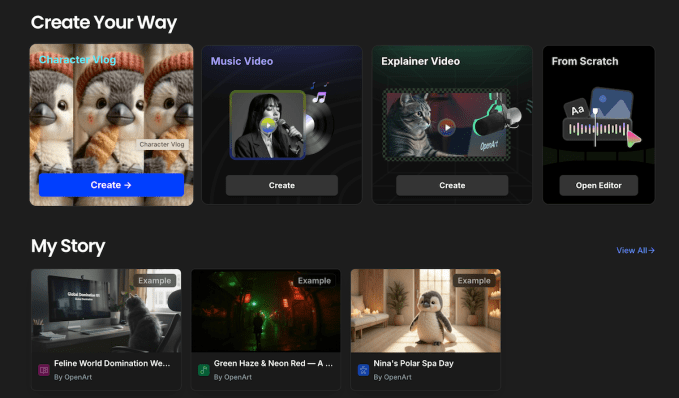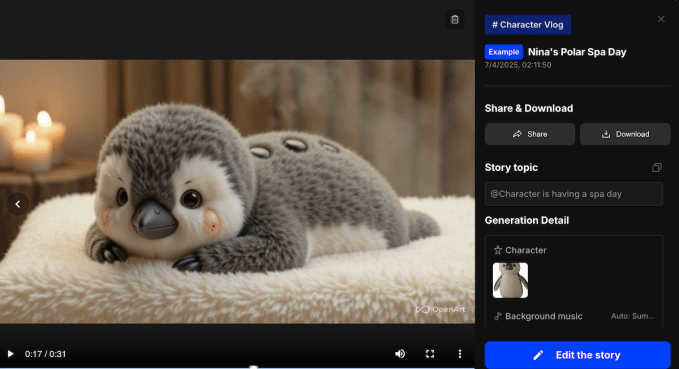In a world where technology and creativity collide, AI-generated videos featuring bizarre characters like a shark wearing sneakers and a ballerina with a cappuccino for a head are capturing the attention of millions of users, particularly among younger demographics. At the forefront of this trend is OpenArt, a startup founded by two former Google employees in 2022 that now boasts around 3 million monthly active users.


OpenArt recently launched an innovative "one-click story" feature in open beta, revolutionizing the way users create videos. By inputting a single sentence, script, or song, users can transform their ideas into one-minute videos with a story arc. The possibilities are endless, ranging from light-hearted TikTok content to more serious explainer videos and music videos for YouTube. OpenArt even envisions this feature being utilized for advertising purposes.
The one-click story feature offers three templates to choose from: Character Vlog, Music Video, or Explainer. For a character vlog, users upload an image of their character and enter a prompt. If a song is uploaded, the software analyzes the lyrics and creates an animation that aligns with the song's themes, such as illustrating flowers blooming in a garden.
Users can refine their creations by revisiting the editor's storyboard mode and tweaking prompts for a more polished result. OpenArt aggregates over 50 AI models, giving users the freedom to choose their preferred tools, including DALLE-3, GPT, Imagen, Flux Kontext, and Stable Diffusion.
While the goal of the new feature is to lower the barrier for becoming an AI creator, there are numerous ethical issues that arise. These include imitating other artists' styles, intellectual property rights, and the dangers of misuse and creating misinformation. During testing, it was discovered that the Character Vlog option may tread into a grey legal area due to the types of characters it offers, such as Pikachu, SpongeBob, and Super Mario, which could pose risks of intellectual property infringement. In June, Disney and Universal sued AI firm Midjourney over AI-generated images.
Users should be aware that if their videos are found to infringe another's copyright, the video may be taken off social media platforms, and if the user is found to have contributed to the infringement, they can potentially be held liable under copyright law, which can result in legal action from the copyright holder.
"We try to be cautious around IP infringement," said Coco Mao, co-founder and CEO of OpenArt, in an interview with TechCrunch. "When you upload some IP characters, by default, the models we use will reject them, and it's not able to produce the IP character, but sometimes it slips." Mao added that the company is open to talking to major IP holders to get licensing for characters.
One aspect that sets OpenArt apart is its ability to maintain character consistency. Unlike the average video model that often relies on simple, standalone clips that users have to piece together into a cohesive story, OpenArt aims to ensure that both the visuals and the narrative remain consistent. "A problem that a lot of AI couldn't really handle well is to have the character consistent in the same video…If you don't have the same character, then it's hard to get immersed in the story," Mao said.
Looking ahead, OpenArt plans to iterate on the one-click feature by allowing users to create videos featuring conversations between two different characters. Another plan on the roadmap is developing a mobile app. OpenArt operates on a credit-based system, offering four plans ranging from $14 per month for 4,000 credits to $56 per month for 24,000 credits. The company has raised $5 million in funding to date from Basis Set Ventures and DCM Ventures and boasts a positive cash flow. OpenArt is on track to achieve an annual revenue rate of over $20 million.